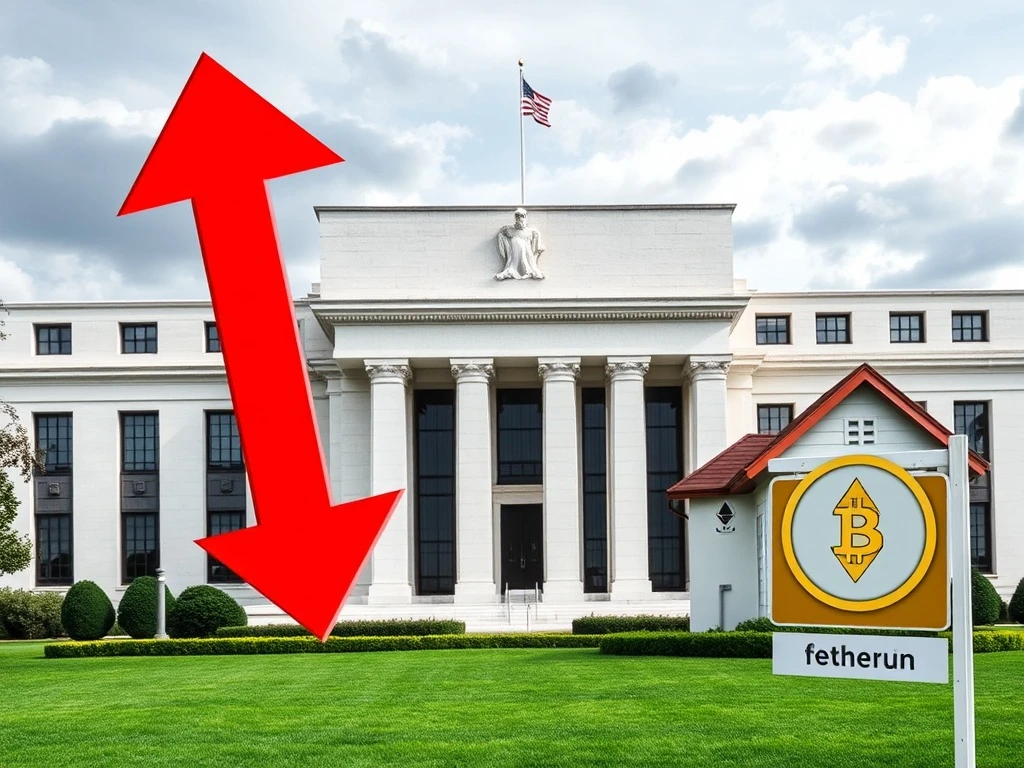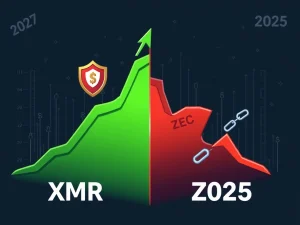Bitcoin News: BlackRock CIO Unveils Critical Flaws in Fed Rate Delays

Are you wondering why the Federal Reserve’s current interest rate strategy is sparking debate among financial giants? The latest Bitcoin News reveals that BlackRock’s Chief Investment Officer of Global Fixed Income, Rick Rieder, has voiced significant concerns, arguing that the Fed’s prolonged high-interest rates are actually harming the U.S. economy, especially the crucial housing sector. It’s a bold claim that challenges the very foundation of current monetary policy, particularly as it impacts a service-driven economy. Let’s dive into why this perspective is gaining traction and what it means for markets, including the world of crypto.
Why is the Fed’s Rate Policy Under Fire?
Rick Rieder’s critique centers on a fundamental shift in the U.S. economy. He argues that the Fed is fighting inflation with tools designed for a goods-oriented economy, while the modern U.S. economy is overwhelmingly service-driven. This disconnect, he believes, makes aggressive rate hikes counterproductive and potentially damaging. Instead of cooling inflation broadly, they disproportionately hurt sectors that rely heavily on credit, like real estate.
- Service Economy Dominance: Rieder emphasizes that services, not goods or manufacturing, are the primary drivers of economic growth today.
- Mismatched Tools: He suggests that the Fed’s traditional inflation-fighting methods are less effective in a service-centric landscape.
- Disproportionate Harm: High rates, according to Rieder, unfairly penalize credit-dependent sectors, creating imbalances rather than fostering stability.
How is the Housing Market Impacted by High Rates?
Perhaps the most poignant example Rieder highlights is the direct and severe impact on the housing market impact. He asserts that elevated borrowing costs are stifling demand, choking new construction, and ultimately preventing home prices from moderating. His argument is counter-intuitive to some: lowering rates could actually help bring housing prices down by stimulating more supply. Imagine a scenario where builders can access cheaper capital, leading to more homes being built, which naturally eases price pressures. This is Rieder’s vision for a healthier housing sector, a stark contrast to the current reality where affordability remains a significant hurdle for many.
Rieder even proposed a hypothetical rate cut to 3.25%—still above current inflation levels—as a potential catalyst. He believes such a move could:
- Stimulate new construction.
- Increase housing supply.
- Ultimately reduce housing inflation by balancing supply and demand.
What Does a Service Economy Mean for Interest Rates?
Understanding the distinction of a service economy is crucial to Rieder’s argument. Unlike manufacturing, where higher interest rates might curb demand for goods and reduce production costs (e.g., raw materials), a service economy operates differently. Services often involve human labor, innovation, and intellectual capital, which are less directly impacted by commodity prices or factory output. When interest rates are high, it becomes more expensive for businesses to expand, hire, or invest in service-oriented ventures, and for consumers to access credit for services (like mortgages or personal loans for education/travel). This, Rieder argues, creates a drag on the economy without effectively targeting the core inflationary pressures unique to services.
BlackRock CIO’s Influence on Market Expectations and Crypto
As a prominent voice from BlackRock CIO Rick Rieder, his comments carry significant weight in financial circles. Despite his advocacy for easing, the broader market remains cautious. The CME FedWatch Tool, for instance, indicates a high probability (around 95.9%) that rates will remain unchanged after the upcoming July FOMC meeting, with only a slim chance of a cut. This skepticism is bolstered by recent strong economic data, including robust job reports, which reinforce the Fed’s commitment to its current hawkish stance.
However, Rieder’s perspective could influence investor sentiment, particularly in risk assets like cryptocurrencies. Historically, lower interest rates tend to drive inflows into crypto as investors seek higher returns outside of traditional fixed-income instruments. While Bitcoin (BTC) inflows have seen some sluggishness, Ethereum (ETH) ETFs have notably outpaced their Bitcoin counterparts in recent periods, attracting substantial net inflows:
| Asset | Net Inflows (July 21-25) |
|---|---|
| Ethereum (ETH) ETFs | $1.85 billion |
| Bitcoin (BTC) | $72 million |
This trend suggests that while the overall crypto market watches the Fed, specific assets like ETH are showing independent strength, possibly anticipating future shifts or reacting to unique catalysts.
Rieder’s powerful insights highlight a growing tension between traditional monetary policy frameworks and the evolving realities of a modern economy. His call for a nuanced approach to interest rates, one that acknowledges the dominance of the service sector and its unique vulnerabilities, resonates deeply. As the July FOMC meeting looms, the debate between maintaining price stability and fostering economic growth, especially in the housing sector, will be front and center. For crypto investors, these discussions are not just academic; they directly influence the flow of capital and the future trajectory of digital assets. Keeping an eye on these macro-economic signals is more crucial than ever.
Frequently Asked Questions (FAQs)
Q1: Why does BlackRock CIO Rick Rieder criticize the Fed’s rate policy?
A1: Rick Rieder argues that the Fed’s prolonged high-interest rates are designed for a goods-driven economy, whereas the U.S. economy is now primarily service-driven. He believes this mismatch causes disproportionate harm to credit-dependent sectors like housing.
Q2: How does the service-driven economy affect interest rate policy?
A2: In a service-driven economy, high interest rates can stifle investment, hiring, and consumer spending on services, without effectively addressing inflation caused by factors unique to the service sector. Rieder suggests this requires a different monetary policy approach.
Q3: What is the impact of current interest rates on the housing market?
A3: Rieder states that current high interest rates increase borrowing costs, which stifles new construction and demand, making housing less affordable. He argues that lower rates could actually stimulate building and help reduce housing inflation.
Q4: How might Fed policy changes affect the cryptocurrency market?
A4: Historically, lower interest rates tend to make risk assets like cryptocurrencies more attractive, as investors seek higher returns. While Bitcoin inflows have been modest, Ethereum ETFs have recently seen significant inflows, indicating potential investor shifts in anticipation of future policy changes.
Q5: What is the current market expectation for the July FOMC meeting?
A5: According to the CME FedWatch Tool, there is a high probability (around 95.9%) that the Federal Reserve will keep interest rates unchanged following the July FOMC meeting, reflecting a cautious stance despite calls for easing.









